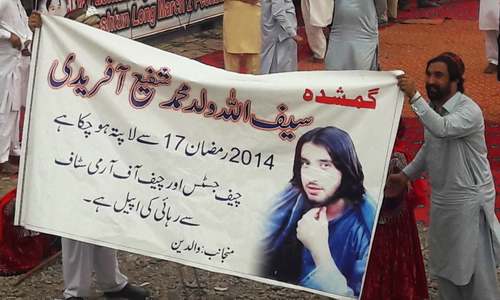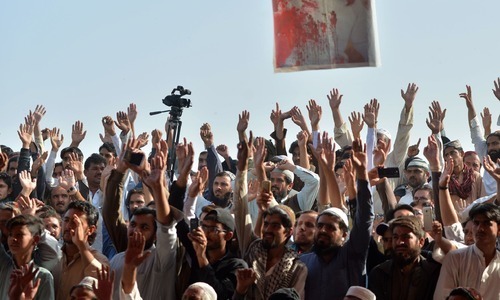Pashtun Tahafuz Movement's (PTM) grand gathering in Peshawar kicked off on Sunday afternoon with the speakers demanding the release of missing persons as well as provision of basic human rights to the Pakhtun community in Pakistan.
People numbering in thousands, from Khyber Pakhtunkhwa and Federally Administered Tribal Areas (Fata), participated in the gathering at Pishtakhra Chowk near Ring Road and intermittently chanted the slogan da sang azadi da (what kind of freedom is this) — their movement's rallying cry.
The families of missing persons arrived at the gathering holding pictures of their loved ones, whose whereabouts remain unknown.
The protesters were largely mobilised through social media, as well as pamphlets and PTM workers creating an awareness about the movement among local communities. It is pertinent to mention that mainstream TV channels across the country gave little to no airtime to the Sunday protest.
"We are only against the oppressors," PTM leader Manzoor Pashteen told a charged audience as he took the stage.
"We are only the 'agents' of our nation," he said, addressing allegations that the movement is being backed by foreign agencies.
"What has happened so far for the missing persons?" he asked. "The mothers and elders whose beloveds are missing should not be coerced."

"In Karachi, money is taken in return for bodies. Even Genghis Khan did not take money after killing people," Pashteen said.
"After Rao Anwar (the ex-SSP Malir accused of the extrajudicial murder of Naqeebullah Mehsud), it is now the turn of Ehsanullah Ehsan (former TTP leader)," he said, demanding that the erstwhile TTP spokesperson should be brought to the courts.
"After Ehsanullah, we will bring [former president] Musharraf to the courts," he added.
He also spoke about how businesses in Fata have been affected by the ensuing violence. "Fruit from Wana and Swat is being sold in Lahore instead of Peshawar."
"In Waziristan, the 'good Taliban' are threatening the people," he said.
Pashteen demanded that the practice of imposing curfews in Fata should come to an end, and that schools, hospitals under occupation should return to their usual course of action.
"We will go to every village until our demands are met," Pashteen announced, adding that more jalsas will be held in Karachi, Hyderabad, Loralai and Bannu, followed by a sit-in in Islamabad.
He also announced that a gathering named "Jalsa Raddul Fasaad" will be held on April 22 in Lahore, whereas another one in Swat on April 29 will be called "Raah-e-Raast".

The Islamabad sit-in would end only after an international guarantee, Pashteen told the audience.
He also said that a rally will be taken to Waziristan after Ramazan.
"We have to give the coming generations a bright future," he concluded.
'Missing persons should be presented in courts or released'
Norab Jan, one of the thousands in attendance, said that his two brothers and son were abducted three years ago.
“We knocked at every door to get some knowledge but yet we have no clue where they are,” the 80-year-old told said. “If they are alive or dead, we don't know. We want them presented in a court of law. If they are guilty they should be punished, if not they should be released.”
'Basic rights'
Earlier, highlighting the plight of the tribal people, PTM's central leader Ali Wazir said that bloodshed was being spread across the country. "The people of Fata have been rendered homeless while their belongings have been destroyed," he added, demanding a human rights commission — rather than a judicial commission — to investigate the issues of Fata's people.
Meanwhile, PTM leader Sanna Ejaz demanded the closure of National Logistics Cell units in Torkham, Chaman and Ghulam Khan, as well as the return of properties in Swat and Malakand to their rightful owners.
Read: ‘Pakhtun Tahaffuz Movement has no anti-state agenda’
"The people of tribal areas should be given the same rights as the people of Lahore and Islamabad," she said, demanding an end to target killing of Pakhtuns and the provision of basic human rights to the people of tribal areas.
Other speakers demanded that facilities such as hospitals, schools and colleges should be provided in Fata, vowing to continue their demand for rights within the ambit of the Constitution.
"Sindhis, Balochs and even the oppressed Punjabis are looking towards you today," a speaker said in Urdu, addressing the crowd, adding that the movement's leader Manzoor Pashteen is the last hope of the oppressed in the country.
The speakers included a mix of emotionally charged young men and women as well as elders, who read poems.
Related: Mazari red cap orders increase ahead of PTM meet
Leaders of other political parties also spoke at the gathering. Pakhtunhwa Milli Awami Party (PkMAP) Senator Usman Kakar said that whoever wants peace, education, employment and hospitals for Pakhtuns is a friend, while those wanting unrest are the enemy.
"Rao Anwar is the name of a mindset which should be put to an end," Senator Kakar said.
There were unconfirmed reports of 3G and 4G internet service being interrupted in the area. A Twitter account — said to be the movement's official account — alleged that "internet connectivity was being constantly interrupted by the state".
The Pakhtun spring
Reports of protests led by the PTM in Islamabad first made headlines following the extrajudicial killing of Waziristan native Naqeebullah Mehsud — a shopkeeper and aspiring model — in Karachi in January.
The PTM — an organisation working for the rights of those affected by war on terror in Tribal Areas especially those from South Waziristan — staged protests in different parts of the country against alleged enforced disappearances, extrajudicial arrests and killings, as well as the alleged mistreatment of the Pakhtun community by security forces.
Explore: Pakhtun renaissance
The movement's leaders claim that in the past decade, 32,000 Pashtuns have gone missing from Fata. They insist that their struggle is to ensure implementation of the Constitution, under which law-enforcement agencies are supposed to provide details of the people they pick up and present them before courts.

















































